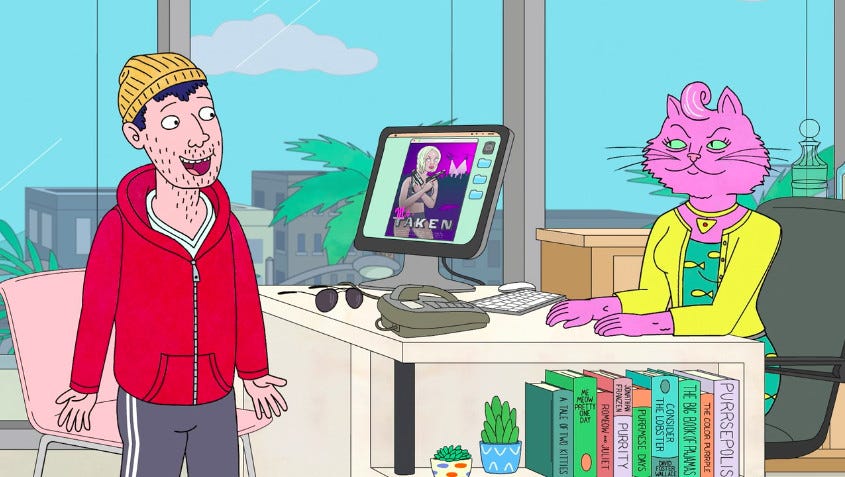How to get staffed on a TV show, Part 1: Get in the conversation.
Over the next four weeks, I'll be publishing a step-by-step guide to the TV staffing process, but that work begins before the job opportunity even exists.
As a literary manager, a big part of my job is getting writers staffed on TV shows.
I have found jobs for clients working on shows like Ginny & Georgia, P-Valley, Hacks, grown-ish, Reasonable Doubt, and The Upshaws. If working as a TV staff writer is your goal, this 4-part series is for you:
Part 1: Get in the conversation. (you are here!)
Step 1: Determine what kind of writer you are.
If you don’t know where you’re going, you’ll never get there.

More importantly, no one will hire you unless they know what kinds of jobs you’re ready to do. When you’re just starting out, it’s important to have a clear understanding of the kinds of shows you want to work for. Think about your voice as a writer, the themes you enjoy writing about, the background of experience you have, and the stories you want to tell.
Look at the current television landscape and determine which shows you want to write on.
Examples of TV writer types include:
Drama
Network
detective procedural (Lucifer, The Rookie, Castle)
family (This is Us, A Million Little Things)
genre (Lost, Heroes, Manifest)
legal procedural (Law & Order: SVU, NCIS, Blue Bloods)
medical procedural (The Resident, New Amsterdam, Chicago Med)
soapy drama (Grey’s Anatomy, Station 19, Scandal)
workplace (Empire, Suits, Chicago Fire)
Cable/Streaming
American anime (League of Legends: Arcane, Blue Eye Samurai, Invincible)
crime (The Wire, The Sopranos, Dexter)
dark, psychological (True Detective, Fargo, Sharp Objects)
fantasy genre (Game of Thrones, Shadow & Bone, Lord of the Rings)
four quadrant genre (Wednesday, A Series of Unfortunate Events, Percy Jackson)
horror/thriller (Servant, From, Yellowjackets)
mystery (Broadchurch, The Killing, Twin Peaks)
sci-fi, grounded (Severance, Devs, Black Mirror)
sci-fi, high concept (The Expanse, Altered Carbon, Raised by Wolves)
period (The Crown, The Great, Downton Abbey)
political thriller (Bodyguard, Homeland, The Diplomat)
prestige (Succession, Mad Men, Breaking Bad)
psychological thriller (You, Love & Death, The Sinner)
romance (Bridgerton, Virgin River, Outlander)
soapy drama (Ginny & Georgia, Devious Maids, Sweet Magnolias, The Fosters)
spy thriller (The Americans, The Recruit, Killing Eve, Jack Ryan)
superhero genre (The Boys, The Umbrella Academy, Jessica Jones, Loki)
true crime (Mindhunter, The Jinx, Dahmer)
world-building (Westworld, Man in the High Castle, The Last of Us)
YA (Pretty Little Liars, Gossip Girl, 13 Reasons Why)
Comedy
Network (joke heavy)
half-hour family (New Girl, Modern Family, Young Sheldon, Mom)
half-hour workplace (Abbott Elementary, The Office, Brooklyn Nine-Nine)
hour-long procedural (Monk, Psych, Castle, Good Girls)
late night (Stephen Colbert, Jimmy Kimmel, Taylor Tomlinson, Jimmy Fallon)
prime time animation (The Simpsons, Bob’s Burgers, Family Guy, Futurama)
sketch (Saturday Night Live)
Cable/Streaming
adult animation (Hazbin Hotel, Rick and Morty, Big Mouth, Bojack Horseman)
dramedy (The Bear, Beef, Better Things, Single Drunk Female, Fleabag, Barry)
four quadrant animation (Avatar: The Last Airbender, Steven Universe)
hard funny (The Other Two, It’s Always Sunny in Philadelphia)
hour-long comedy (Shameless, Crazy Ex-Girlfriend, Jane the Virgin)
kids’ animation (The Loud House, Zombies!, Dora the Explorer, Hilda)
semi-scripted (The Rehearsal, Jury Duty, Who is America?)
Don’t feel the need to be contained by one of these.
You can combine multiple categories to make your writer brand even more specific:
Is Man in the High Castle period, sci-fi, or world-building?
Is Dexter dark psychological thriller, comedy, or procedural?
Is Bojack Horseman adult animation or dramedy?
What I really don’t want you to do at this stage is try to fit multiple, different categories separately. It’s better to be the *best* candidate for just a few jobs than one of hundreds of potential candidates for most of the jobs.
You can always open up and try new things once you’re established in your career, but right now it’s best to narrow your focus.
Step 2: Have your writing samples ready.
Now that you know what kind of show you want to write on, do you have a script that matches that show?
At this stage of your career, I recommend having at least two solid scripts in the genre you want to write in.
It’s better to put everything you know about your craft into two really solid works than it is to keep writing and generating material that isn’t getting you anywhere. Do an honest inventory of your skills: is there an area you need to level up in? What classes can you take to attack your weaknesses until they become strengths?
Once you have two viable scripts that match the genre you want to write in, people will start taking you seriously.
Step 3: Get an agent or manager.
During this entire process, you should be nurturing and expanding your own personal network in the entertainment industry.
An agent or manager can multiply that reach for you by sending your script out to dozens, even hundreds of executives for you to get to know.
A manager can help you determine whether your script matches the kinds of jobs that you want.
They can fill holes in your network of contacts. They can give you advice about where the industry is moving and where you can hope to get work based on your experiences, skills, and the current landscape.
Having a manager isn’t crucial to getting your first staffing gig. You can skip this step if you:
Step 4: Get writers’ room experience.
I am about to give you some tough love that you might not want to hear:
So many writers complain about what they call “the chicken and the egg problem.” It’s that managers don’t want to talk to you if you don’t have credits, and it’s impossible to get credits if you don’t have a manager putting you up for jobs.
But the truth is that managers do not make hiring decisions. Showrunners do.
The best way to get a staff writer job is to have a famous dad or a parent who is the head of a studio.
But failing that, the most common way to get staffed is to be promoted out of a support staff position (Writers’ Assistant, Showrunner’s Assistant, or Script Coordinator). I know this isn’t what you want to hear because of a few reasons:
Assistant jobs on shows can feel just as hard to get as Staff Writer jobs.
Assistant jobs require grueling hours and not great pay.
There is no guarantee an assistant job will result in a promotion to staff writer.
You have to be in Los Angeles for an in-person job as an assistant.
I get it. I do. As a millennial, I struggle with the betrayal I feel from being told at a young age that I could do anything as long as I [x, y, z], only to grow up and be confronted by an unfair world whose goalposts for success are constantly moving.
But that doesn’t change the reality of the situation.
And it’s better to acknowledge how the world works than it is to operate as if we were under some meritocracy that gives a job to the most talented person or the person who wants it the most.
Because that’s not how it works. I even hear managers complain about this: All showrunners want to do is hire their friends.
Of course!
Imagine you’re a showrunner. You have a million things to deal with every day, including but not limited to the creative success of your show. You’re going to want to hire someone who:
You can trust.
You know can get the job done.
A person who has been with you from day one and a person who has experience in that writers’ room is going to be a much more ideal candidate than someone they have never met and don’t know.
It might not be fair, but it is human nature.
If you can, by hook or by crook, somehow get a job in a writers’ room, do it. Make it work. At least for a few years. If this is your dream, you should do anything you can to make it happen.
If you can’t, for whatever reason, get in or near a writers’ room, if you can’t get yourself into a position in which you’re making friends with showrunners, then I recommend prioritizing a different path in professional TV writing. You’ll have better luck:
Creating and selling your own original show.
Writing and selling a feature film script.
Optioning your IP (book, short film, short story, etc.) as a TV show for a more experienced writer to develop.
But if you’re still dead set on staffing, here’s what you need to do:
Step 5: Take as many general meetings as you can.
You know exactly what kind of show you want to write on, that you are best suited for.
You have rock solid samples that are at the level of a professional TV writer. You have an agent or manager who is ready and excited to take you out to the town. The next thing to do is to meet as many executives in the industry as you can:
producers
development executives
creative executives
assistants
coordinators
studio executives
network executives
Ideally, your manager should be setting you up these meetings for you. They’ll start by making a list of companies that you should meet at, then they will send you to those companies. Once those executives read your script, they will agree to meet with you.
Older resources will refer to this as “the water bottle tour,” but these days all general meetings take place over Zoom.
Just because you sign with a manager doesn’t mean you get to kick back and not do anything to keep networking.
Even with a rep in your corner, you should still be setting as many of your own meetings as you can. Pretend that you don’t have a manager and that you’re still on your own. This will exponentially increase your reach because:
You’re taking ownership of your own network and your own career.
You are practicing getting comfortable with making asks and putting yourself out there.
Telling your manager that you are meeting with people will make that person work even harder for you. We want to know that our clients have a vested interest in their own career, and nobody wants to be outworked by our own clients.
Bugging your manager to set more meetings for you won’t convince them to do it. Telling them about the meetings you set will.
There is no downside to taking the fate of your own career into your own hands. No one will ever care more about your writing career than you will. Act accordingly.
But where do I find my own general meetings?
Your personal network. - I’m sorry if this is redundant, but you don’t get to skip this step. As you meet with people and talk about yourself, they will often naturally bring up in conversation other people you should meet with. Follow up on this and ask them to make an email introduction or set up a meeting for you.
Networking events. - Do a little research and get creative. Try joining ULSC, JHRTS, or other writer/executive organizations you can find.
Fellowships, Competitions, and Incubators. - Easier said than done, I know. But there are plenty of competitive programs out there that will put winners in touch with industry professionals. If you can’t get into any of these, you probably should be more focused on honing your craft than getting staffing meetings anyway. But keep applying consistently! The rumors are true: studio fellowships reward writers who apply year after year for multiple years.
The internet. - If you can do it without being weird, social media is a great place to network. Be kind, genuine, and reciprocal. You can find industry friends anywhere people are talking about the craft and business of TV writing.
Become friends with assistants. - Do NOT overlook the overworked, underpaid people who make this town run. If you are an assistant, network with other assistants. Befriend them. Do favors for one another. Keep it genuine, but build strong ties. You never know how they’ll pay off. If you’re not an assistant, befriend them anyway! Get your manager’s assistant a Christmas gift. Take them out for lunch or coffee (remember when I said assistants are underpaid? Don’t make it weird, but try offering to buy them dinner if you get along). Be kind to assistants. Treat them as people. They won’t stay in that position for long.
Once you have these meetings, your work still isn’t done:
Step 6: Solidify your network by creating “fans.”
You’re not having all these meetings for fun.
You’re meeting with as many people as possible. You’re wowing them in the room. You’re talking to them about your own personal experience and what excites you as a writer. You’re sharing insight about what you have been watching, reading, and loving.
All this because when a staffing job finally opens up, it is so much easier for a manager to call and ask “you remember this writer, right? You should hire them!” Than it is for a manaer to say to an executive, “I know 100 other managers have called you today, but you have to meet this brand new writer you’ve never heard of. They’d be perfect for your show!”
The goal is for you to be at the top of the list already.
For a showrunner, producer, or executive to say, “I already know a writer who is perfect for this.”
This is why strong, specific branding is so important. This is why creating a genuine, strong connection in that general meeting is so important. You want to turn that executive into a career-long fan of yours.
You want them to actively look for something to hire you on. This is why you don’t just show up to the meeting, charm the person for an hour, and call it a job well done.
No.
You listen to them. You engage in a meaningful conversation. You remember what they talked about and what they like. You remember personal details about them and their interests.
If you genuinely liked them, send a follow-up email to thank them for the meeting.
Sometimes general meetings don’t go well. For whatever reason, the two of you just don’t vibe or don’t get along. That’s okay and it’s perfectly normal. There are as many different executives in the world as there are people. You’re not going to be everyone’s cup of tea.
And that’s okay. Because remember, you want to be at the *top* of a few lists, not in the middle of a ton.
So when you do get along with an executive, send them a follow up email at least every 6 months or so. Tell them about your career updates, but also ask them about their kids. Send them articles that made you think of them. Share memes that are relevant to the topics you discussed.
Stay top of mind, and nurture this connection. Turn it into a real friendship.
You’re not just a writer they met with once. You’re a friend. They’re a fan. When a job comes up that you’re perfect for, you’re already in the conversation before you even know that opportunity exists.
Ready for Part 2? Click here for How to Land the Meeting.








Your post is super helpful and breaks it down so getting staffed on a show doesn't seem unreachable, however you mentioned another route which is selling "your own show." Any knowledge or blueprint you can share about the steps to selling your show would be welcomed.
I don’t even know what to say. This is beyond insightful and amazing! Thank you for putting in the work to break it down. You are for sure the wizard behind the curtain. We are lucky! Thanks.